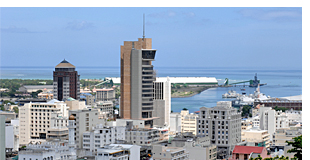“ Mauritius has taken steps in recent years to attract investments by enacting reforms that protect investors and promote business. They’ve made it easier to launch start-ups, to access credit, and to register property. They’ve demonstrated a commitment to transparency, accountability, and good governance”
Secretary of State Hillary Rodham Clinton. Launch of the Bilateral Investment Treaty with Mauritius (Aug 5, 2009)

Mauritius is the strategic global business centre situated in the Indian Ocean, off the coast of Southern Africa. The island offers an ideal environment to operate their business and provide an attractive package of fiscal incentives, coupled with a conducive regulatory framework.
Mauritius is a member of the British Commonwealth and is associated to the European Union as an ACP ( Africa-Caribbean-Pacific ) state. Mauritius is also a member of the Common Market for Eastern and Southern Africa ( COMESA) and of the South Africa Development Comminity ( SADC ) . It is a founder member of the Indian Ocean Commission ( IOC) as well as of the Indian Ocean Rim Association for regional Co-operation ( IOR-ARC) and one of the Member states of the ACP/EU Convention.
Mauritius has a population of 1.2 million and Mauritians are bilingual , being equally fluent in English, the official language ,as well as French.
The Economy
 Since independence in 1968, Mauritius has developed from a low-income, agriculturally based economy to a middle-income diversified economy with growing industrial, financial, and tourist sectors. For most of the period, annual growth has been in the order of 5% to 6%. This remarkable achievement has been reflected in more equitable income distribution, increased life expectancy, lowered infant mortality, and a much-improved infrastructure.
Since independence in 1968, Mauritius has developed from a low-income, agriculturally based economy to a middle-income diversified economy with growing industrial, financial, and tourist sectors. For most of the period, annual growth has been in the order of 5% to 6%. This remarkable achievement has been reflected in more equitable income distribution, increased life expectancy, lowered infant mortality, and a much-improved infrastructure.
The economy rests on sugar, tourism, textiles and apparel, and financial services, and is expanding into fish processing, information and communications technology, and hospitality and property development. Sugarcane is grown on about 90% of the cultivated land area and accounts for 15% of export earnings.
The government's development strategy centers on creating vertical and horizontal clusters of development in these sectors. Mauritius has attracted more than 32,000 offshore entities, many aimed at commerce in India, South Africa, and China. Investment in the banking sector alone has reached over $1 billion. Mauritius, with its strong textile sector, has been well poised to take advantage of the Africa Growth and Opportunity Act (AGOA).


